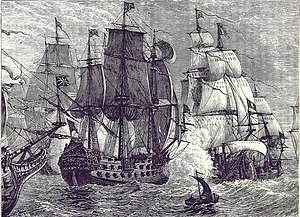Battle of Dover (1652)
| Battle of Goodwin Sands | |||||||
|---|---|---|---|---|---|---|---|
| Part of First Anglo-Dutch War | |||||||
 An illustration of the battle | |||||||
| |||||||
| Belligerents | |||||||
|
|
| ||||||
| Commanders and leaders | |||||||
|
|
| ||||||
| Strength | |||||||
| 47 ships | 25 ships | ||||||
| Casualties and losses | |||||||
| 1 ship captured | Unknown | ||||||
The naval Battle of Goodwin Sands (also known as the Battle of Dover), fought on 19 May 1652 (29 May 1652 Gregorian calendar),[a] was the first engagement of the First Anglo-Dutch War between the navies of the Commonwealth of England and the United Provinces of the Netherlands.
Background
The English Parliament had passed the first of the Navigation Acts in October 1651, aimed at hampering the shipping of the highly trade-dependent Dutch. Agitation among the Dutch merchants had been further increased by George Ayscue's capture in early 1652 of 27 Dutch ships trading with the royalist colony of Barbados in contravention of an embargo. Both sides had begun to prepare for war, but conflict might have been delayed if not for an unfortunate encounter on 29 May 1652 (19 May in the Julian calendar then in use in England) near the Straits of Dover between a Dutch convoy escorted by 40 ships under Lieutenant-Admiral Maarten Tromp and an English fleet of 25 ships under General-at-Sea Robert Blake.
Battle
An ordinance of Cromwell required all foreign fleets in the North Sea or the Channel to dip their flag in salute, but when Tromp did not comply because he saw no reason to lower his flag for the English, Blake fired three warning shots. When the third hit his ship, wounding some sailors, Tromp replied with a warning broadside from his flagship Brederode. Blake then fired a broadside in anger and a five-hour battle ensued.
Aftermath
Both fleets were damaged, but as darkness fell the Dutch fleet withdrew in a defensive line to protect the convoy, and the English captured two Dutch stragglers: Sint Laurens, which was taken back by them but not used, and Sint Maria, which was abandoned in a sinking condition and later made its way to the Netherlands. Tromp then offered his excuses to Blake and asked for the return of the prize, but this was refused by Blake.
War was declared by the Commonwealth on 10 July 1652.
Ships involved
England (Robert Blake)
Totals: Ships: 24 Cannon: 908
- Anthony Young's squadron
- President 36 (Anthony Young)
- Nightingale 24 (Jacob Reynolds)
- Recovery 24 (Edmund Chapman)
- Robert Blake's squadron in Rye Bay
- James 60 (flag, Robert Blake, captain John Gilson)
- Victory 52 (Lionel Lane)
- Garland 44 (John Gibbs)
- Speaker 52 (John Coppin)
- Ruby 42 (Anthony Houlding)
- Sapphire 38 (Robert Moulton, Jr)
- Worcester 42 (Charles Thorowgood)
- Star 24 (Robert Saunders)
- Portsmouth 36 (William Brandley)
- Martin 12
- Mermaid 24 (Richard Stayner)
- Ruben 26 (merchantman)
- 3 small
- Nehemiah Bourne's squadron in the Downs
The Netherlands (Maarten Tromp)
Totals: Ships: 44 Cannon: 1274
- Convoyers
- Groningen 38 (Joris van der Zaan)
- Zeelandia 34 (Jacob Huyrluyt)
- The fleet in The Downs
- Van
- Brederode 54 (Maarten Tromp, Admiral, RD)
- Alexander 28 (Jan Maijkers, AD)
- Blauwen Arend 28 (Dirck Pater, AD)
- Sint Salvador 34 (Matheeus Corneliszoon, AD)
- Vliegende Faam 28 (Jacob Corneliszoon Swart, AD)
- Arche Troijane 28 (Abraham van Kampen, AD)
- Kroon Imperiaal 34 (Cornelis Janszoon Poort, AD)
- Valck 28 (Cornelis Janszoon Brouwer, AD)
- Prinses Roijaal 28 (Maarten de Graeff, AD)
- Neptunis 34 (Gerrit van Lummen, AD)
- Sint Matheeus 34 (Cornelis Naeuoogh, AD)
- Prins Maurits 34 (Nicolaes de With, AD)
- Rozeboom 28 (Gerrit Schuyt, AD)
- Engel Gabriel 28 (Bastiaan Bardoel, AD)
- Witte Lam 28 (Cornelis van Houten, AD)
- Gideon van Sardam 34 (Hector Bardesius, AD)
- Sint Francisco 28 (Stoffel Juriaenszoon, AD)
- David en Goliad 34 (Claes Bastiaenszoon Jaarsveld, AD)
- Elias 34 (Jacob Sijvertsen Spanheijm, AD)
- Zwarte Leeuw 28 (Hendrik de Raedt, AD)
- Sint Maria 28 (Sipke Fockes, AD) - Captured but abandoned and recaptured
- Groote Liefde 38 (Bruyn van Seelst, AD)
- Nassouw van den Burgh 34 (Lambert Pieterszoon, AD)
- Groote Vergulde Fortuijn 35 (Frederick de Coninck, AD)
- Engel Michiel 28 (Fredrick Bogaart, AD)
- Vergulde Haan 30 (Jan le Sage, MD)
- Goude Leeuw 30 (Jacob Penssen, MD)
- Leeuwinne 30 (Joannes van Regermorter, MD)
- Sint Laurens 30 (Bastiaan Tuynemans, MD) - Captured
- Witte Lam 32 (Jan Tijssen Matheeus, VD)
- Rear
- Monnikendam 32 (Pieter Florissen, Rear Admiral, NKA)
- Wapen van Hoorn 24 (Pieter Aldertszoon, NKA)
- Prins Maurits 28 (Cornelis Pieterszoon Taenman, NKA)
- Monnikendam 24 (Arent Dirckszoon, NKA)
- Wapen van Enkhuizen 30 (Gerrit Femssen, NKA)
- Wapen van Alkmaar 28 (Gerrit Nobel, NKA)
- Roode Leeuw 24 (Reynst Corneliszoon Sevenhuysen, NKA)
- Peereboom 24 (Tijs Sijmonszoon Peereboom, NKA)
- Huis van Nassau 28 (Gerrit Munth, NKA)
- Alkmaar 28 (Jan Warnaertszoon Capelman, NKA)
- Sampson 26 (Willem Ham, NKA)
- Stad van Medemblik 26 (Pieter Schellinger, NKA)
- AD - Amsterdam Admiralty and Directors' ships
- MD - Middelburg Admiralty and Directors
- NKA - Noorder-Kwartier Admiralty
- RD - Rotterdam Admiralty
- VD - Vlissingen Directors
Notes
- ^ During this period in English history dates of events are usually recorded in the Julian calendar, while those the Netherlands are recorded in the Gregorian calendar. In this article dates are in the Julian calendar with the start of the year adjusted to 1 January (see Old Style and New Style dates).
51°16′26″N 1°30′29″E / 51.274°N 1.508°E
References
This article needs additional citations for verification. (December 2007) |
